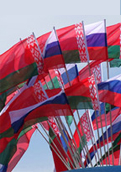BRICS Cooperation in Science and Education
This article examines the preconditions and reasons for interaction between BRICS countries in the fields of science, research and university education. It analyzes the particular ways in which the member countries develop and coordinate their positions in these areas. It also reviews and evaluates the practical experience gained from cooperating on scientific and technological research and innovation (STRI), and the functioning of the BRICS Network University, and considers the prospects for further joint work in these areas.
- Igor Kovalev , Alina Shcherbakova
- November 2019






